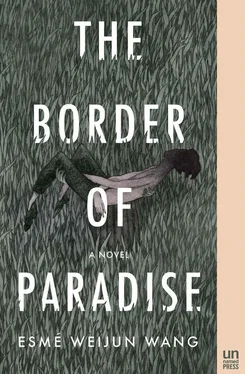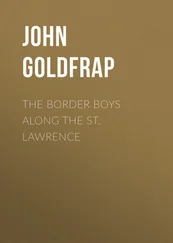Esmé Weijun Wang
The Border of Paradise
FOR CHRIS.
Here we are,
the constellation of
a coupled single star.
A prison becomes a home if you have the key.
— George Sterling
Real goodness was different, it was irresistible, murderous, it had victims like any other aggression; in short, it conquered. We must be vague, we must be gentle, we are killing people otherwise, whatever our intentions, we are crushing them beneath a vision of light.
— James Salter, Light Years
I’ve never known a man who has taken his own life, and so I’ve never read a suicide letter, seeing as how the final words of such uncelebrated and self-condemned souls are so privately guarded. Still, I can’t help but think such letters all must be the same, because what else can be said but, over and over again, Sorry, sorry, I am so sorry, in the way that someone newly smitten can only say, I love you, I love you, I love you, like one of the Wellbrook patients I grew accustomed to in my incarcerations. In particular I am thinking of a schizophrenic woman with chin-length, ashen hair, stooped in her wheelchair, who repeated the word plum, such that the hum of that word faded into the background of everything, including the screams of other patients, the soft rush of water, plum, puh-lum, until the word shed its meaning, becoming nothing but sound.
This motel room is not as depressing as I thought it would be. Someone has taken pains to make the place palatable; I have yet to see a cockroach. Only one or two flies the size of kidney beans occasionally dive-bomb the air. The bed’s comforter itches, but is printed with an assortment of nice English roses. Note that a man conflicted about his suicide will reflexively stop and smell the proverbial roses. The cheap blue curtains let the light through, and when I first walked to the window to pull them shut I saw that one of them had been carefully stitched near the edge, where I’m assuming it was once torn, and in the end I take this all to mean that this place is as good as any to die. I didn’t want to end things anywhere near the house, where my wife could find me — or, even more horrible to consider, my children. If I had my way, I’d hang myself peacefully from one of the trees in our wood, but that seems more blasphemous than this, somehow, and I’m grateful to this humble little Motel Ponderosa of no significance, which is a small grace.
I had breakfast this morning miles from here with my son, William; my daughter, Gillian; and Daisy, who is my wife. We had bacon, and fry bread cooked in the grease, and eggs fried in whatever grease was left. I watched William sop up the yolk with a crust of bread. I watched Gillian scrape her plate, her hair in a little topknot tied with a red velvet ribbon. I watched Daisy, whose face in the light was worn smooth like a rock under the same persistent current of worry. Click, click, click, I thought, committing them to memory to be preserved and then destroyed, because even in my moribund state I could see the simple beauty of it, and silently I asked the Lord to bless my family, even if neither he nor they will ever forgive me for my desertion. Those three were persistently beset by trouble, and worse, they still loved me; so how this can be anything but a betrayal and an unfairness, I don’t know.
I’ve been returning to The Confessions more than to the Bible these days, but it’s become difficult to understand what I mean to accomplish through any style of confession. I have sinned, and I had hoped to expose and atone for my sins. I hoped to cast them out, as Christ cast the demons into swine, so that the Lord might take pity on my soul — this, despite the saying that God never gives a person more than he can handle — but what about despair? For so many years I have thought I ought to be able to handle this, and the only refrain that returned to me was I’m in pain, I’m in pain, I’m in pain. “Spare Thy servant from the power of the enemy,” said Augustine. And yet Augustine achieved sainthood, an achievement for which not even I am insane enough to dream.

I was born with good fortune, the only son of Francine and Peter Nowak; and my father, whom I called Ojciec, was the president and owner of the Nowak Piano Company. Nowak pianos are less known now. For a handful of decades they were nearly as well known as Mason & Hamlins, or even Steinways, because of their combination of quality and affordability. Our name was significant in a city full of significant names. But for most of my childhood we were at war, with our manufactory building gliders to carry troops behind enemy lines, and during this time we made only four pianos, sent overseas to the troops for entertainment’s sake.
War meant instability. I was only four when the war began, and I can’t recall life before it, but I had absorbed enough to know that the war shoved everything off-kilter. The radio threatened us with new forms and styles of entertainment as much as it threatened its listeners with news from the front. My parents refused to buy one on principle, which meant that news reached us a beat after it hit everyone else, or else we caught snatches and bits of it from family friends; but this, too, seemed to be a purposeful, buffering act. Ojciec visited the factory as though our lives were no different. In watching the rib press, he peered over his glasses at the torque wrench, which had already been double-checked by the workers; he paced vigilantly in the gluey conditioning room and examined the bridge press for inaccurate gauges; he came home smelling of instruments pregnant with music, of chemicals and wood. He came home tired, but the factory also gave him substance. To Ojciec, being the paterfamilias of the remaining Nowak clan meant little if it didn’t involve our pianos as well.
A slender, fair woman with a bump in her thin nose, my mother, whom I called Matka, was primarily occupied with caring for her only son, and secondarily occupied with spending money, albeit in an abstracted, halfhearted way. She brought me with her to estate sales in Blenheim, in Lysander, in Hastings, where we sifted through abandoned belongings and plundered what we wanted, returning to our brownstone with armfuls of yellowing Edwardian dresses and stuffed toys worn with love before being left behind like Moses in the reeds. As I headed up the stairs to my bedroom after such excursions, my arms laden with toys, my mother would put her cool hand on the back of my neck, lean down, and anoint the top of my head with a kiss. It wasn’t as though we were oblivious to what was happening overseas, although I see the oddity now of what Matka and I were doing: buying up the belongings of the dead while the dead piled up away from home. We did, financially and emotionally, feel the pinch of war less than most of Greenpoint. We were utterly grateful to Our Lord for this.

Very early on I realized that I was not like other boys I knew, or not as good at pretending to be anything other than what I was. What energies I had were sadly misdirected, scattershot, toward obscure targets. While I ran around with the other kids in McCarren Park, getting my shoes muddy and looking like any other golden-haired son of Polish America, I was also fretting about my bunny Flopsy’s left eye coming loose as his right one had, until I had to stop and catch my breath, a rising panic looming in my chest and forcing me home. While playing stickball I made myself ill, and even vomited in the grass, from dwelling on Leo the Lion’s head, which had fallen off its crumbling spring. I’d attributed to these dolls a kind of anima or animus. I wouldn’t say that I believed them to be truly living, but I did invest enough of my emotional attention into each one that they may as well have been alive. I kept them in the bottom dresser drawer, away from Ojciec’s disapproval, and dressed them fastidiously in the mornings and again at bedtime. Leaving these chores undone would undo me; it was the beginning of my so-called neuroses, though at the time I had no word for it.
Читать дальше













